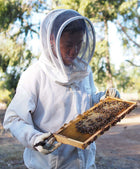Why Honey Belongs in Your Daily Healthy Diet – Singapore’s Reputable Honey

Honey is more than just a sweet treat – it’s a source of natural nutrients and health-promoting compounds. Unlike refined sugar, pure honey contains antioxidants (such as flavonoids and phenolic acids) that help neutralize damaging free radicals. These antioxidants are linked to a lower risk of chronic diseases like diabetes and heart disease. Raw honey also retains trace amounts of vitamins, minerals and enzymes from floral nectar. In Singapore’s humid climate, a daily spoonful of raw honey can gently boost energy and immunity in a way that ordinary sugar cannot. Recent nutrition research emphasizes honey’s unique plant compounds – for example, health experts note that honey is “rich in health-promoting plant compounds”, making it more than “just empty calories.”
Honey vs. Refined Sugar – A Smarter Sweetener
When it comes to sweetening your food or drink, honey has advantages over regular sugar. Table sugar is pure sucrose, but honey is a blend of glucose and fructose plus enzymes from the bees. Bee Bee Natural’s Jarrah honey, for instance has a low glycaemic index – typically in the low 50s – whereas white sugar has a GI around 60–65. A lower GI means honey releases sugar into the bloodstream more slowly, helping avoid the sharp spikes and crashes associated with refined sugar. (Harvard Health warns that high added-sugar diets significantly raise heart disease risk.) Honey’s mild sweetness and rich flavor often let you use less of it than sugar. Moreover, because honey is already partially broken down by natural enzymes, it can be absorbed quickly as a gentle energy source. Nutritionists also point out that honey contains prebiotics (non-digestible oligosaccharides) that feed beneficial gut bacteria. This means raw honey may actually support digestive health, whereas excess refined sugar can disrupt the gut microbiome. However, keep in mind that honey is still a sugar and should be used in moderation. Health experts agree that even the healthiest sweeteners should be limited. A spoonful of honey a day can fit into a balanced diet, but it’s best used instead of sugar, not in addition to it.
Key Health Benefits of Daily Honey
Including honey daily can deliver several health perks. First, honey’s antioxidants and anti-inflammatory compounds help protect your cells. Registered dietitians note that honey contains natural flavonoids and polyphenols, which act as powerful antioxidants in the body. These compounds help tame chronic inflammation – honey is considered a “better and less inflammatory choice than regular sugar”. In practical terms, swapping sugar for honey can mean fewer inflammation spikes and better heart health. In fact, some studies suggest regular honey intake is linked to healthier blood pressure and fat levels.
Second, honey can be a quick energy booster. Its simple sugars provide fast fuel for your brain and muscles without heavy processing. Athletes often use honey as workout fuel because it digests easily and provides sustained energy.
Third, emerging research shows honey has gut-friendly benefits. Certain raw honeys contain prebiotic compounds that help grow good bacteria like Lactobacillus and Bifidobacteria in the gut. A healthier gut microbiome is associated with better digestion and immune function. So your daily honey habit may subtly support digestive balance.
Finally, honey can even ease minor ailments. It’s a traditional remedy for sore throats and coughs – the World Health Organization endorses honey as a natural cough suppressant for children over one year old. While you should not give honey to infants under 1 (due to botulism risk), having a small spoonful or adding honey to tea when you’re under the weather can soothe throat irritation naturally.
Ways to Include Honey in Your Daily Diet
Adding honey to your day is easy and versatile. For example, try stirring a teaspoon of raw honey into your morning tea or coffee instead of sugar. It dissolves well in warm drinks, giving a smooth sweetness plus health benefits. You can drizzle honey over wholegrain toast, pancakes or yogurt for breakfast. Many Singaporeans also enjoy honey with their overnight oats or chia pudding. In cooking and baking, replace sugar with honey at a roughly 1:1 ratio (use a little less liquid to compensate, since honey adds moisture). For snacks, mix honey into nut butters or smoothie bowls. Even a small amount – say ½ to 1 teaspoon daily – can boost antioxidant intake without excessive calories. The key is to let honey be the sweetener instead of sugar. Gradually reducing sugar in favour of honey (with its unique floral flavors) can train your palate to prefer natural sweetness.
Choosing a Reputable Honey Source
Not all honey on the market delivers these benefits – purity matters. Singaporeans looking for a reputable honey want one that is truly raw and unadulterated. Bee Bee Natural prides itself on being a Singapore-based brand offering pure raw honey straight from Western Australian hives. For instance, our Jarrah and Red Gum honeys are single-origin and minimally processed to preserve all the natural goodness. In fact, Bee Bee Natural’s Red Gum honey is “ranked among Singapore’s finest for purity and potency”. That means no added syrups, no ultra-filtration, and no hidden fillers – just honey as nature intended. When you buy from a trusted source like Bee Bee Natural, you can be confident you’re getting the real deal.
In summary, honey can be a valuable part of a daily healthy diet due to its natural antioxidants, gentle energy release, and potential gut benefits. The secret is choosing a pure, high-quality honey. By opting for an ethical Singapore-reputable honey supplier like Bee Bee Natural – whose wild Western Australian honeys are lab-tested and unblended – you ensure each spoonful truly supports your health. So go ahead and sweeten your day with a drizzle of real honey: your body (and taste buds) will thank you!



